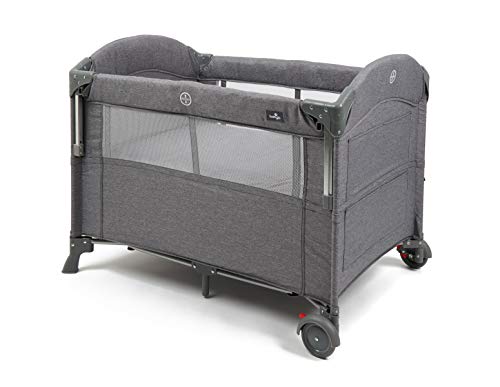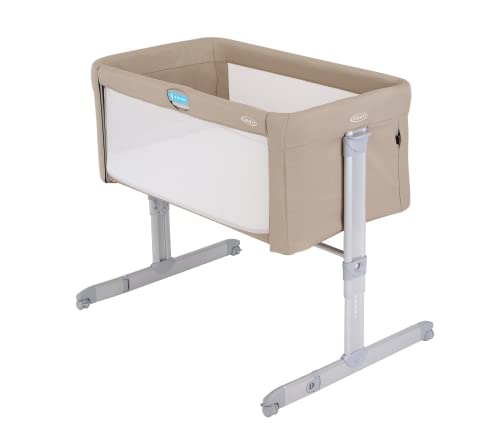You'll Never Guess This Bedside Cosleeper's Secrets
페이지 정보

본문
newborn bedside cot Cosleeper
A bedside cosleeper is a bassinet which is attached to the side of your adult bed. It's safe, so long as you adhere to the CSPC safety guidelines for infant sleep spaces.
These guidelines are similar to crib bedding standards. Learn more about the guidelines here. The most important aspects to take into consideration when selecting the right bedside sleeper are Safety, Comfort, and Convenience.
Safety
In line with the American Academy of Pediatrics' recommendation that infants sleep in the same bed with their parents cosleeping (a method that is sometimes referred to as bed-sharing) has become popular among many expecting and new parents. The Academy notes that room-sharing is safer than sleeping with a baby in the same bed because it lowers the chance of Sudden Unexpected Death in Infancy (also known as SIDS). The AAP doesn't recommend bed sharing however it does suggest that co-sleeping on separate sleeping surfaces is a great way to decrease the risk of SIDS. The creation of the bedside crib was essential for many families.
A bedside cosleeper can be described as a crib-like sleeper that attaches to an adult bed frame. The bedside cosleeper enables parents to easily monitor their baby, and it gives them the freedom of a bed while keeping their child close to them. The most reliable cosleepers meet strict safety standards and are made with durable, high-quality components. To ensure the safety of your child ensure that you look for the Juvenile Products Manufacturers Association stamp of approval. This confirms rigorous testing and quality control.
The safety of a bedside cosleeper depends on several aspects such as how it is installed and secured to the parent's bed. It is crucial that the bedside crib vs cot cosleeper be attached to the parent's mattress in a manner that prevents gaps and spaces, where an infant could be trapped. This can pose an entrapment risk. It is crucial that the attachment system of a bedside cosleeper be examined to determine if it can withstand the force that might be imposed in use, such as the parent rolling on and off the sleeper, or 25-pound. horizontal force applied to the attachment system or the corners of the bedside cosleeper (More inspiring ideas).
The voluntary standard for bedside beds incorporates by reference the federal consumer product safety standard for bassinets and cradles (16 CFR part 1218) that includes requirements for performance for enclosed openings made of fabric. The standard's requirements for mandatory compliance deal with the risk of head and neck traps by requiring after the application, release the 50-lb. The standard also requires that after the release and application of 50-lb. must not be created. ASTM's electronic Reading Room offers read-only versions of the standard.
Convenience
Many parents have resisted cosleeping for fear of suffocation SIDS or the "Ferberization" process that requires children to be in a room by themselves Anthropologists have noted that the majority of mammals and primates, as well as people living in non-Western societies, frequently coslept. It could be because infants are soothed by the familiar voice of their mother and it also helps them learn to self-soothe.
The best bedside sleepers come with an innovative design that is attached to the sides of any bed and swivels for easy access for middle-of-the-night feedings or diaper changes. Find a model with adjustable feet, which retract to accommodate different sizes of mattresses. It should also come with a large storage area for all the baby's necessities.
Select a rocking bedside crib sleeper that fits standard crib bedding, so it is safe to use as your child grows. You may also want to look into a convertible model that could transform into a play area or a deeper bassinet to last for years of use. It folds easily for transport.
Portability
 A bedside sleeper with wheels or a base that is lightweight is more portable than one with a bulky wooden frame or a substantial base. The babybay bedside sleeper HALO bassiNest essencetia, as well as Snoo Smart Sleeper are all movable. They have adjustable feet that can be retracted to accommodate platforms and legs that fold inwards to provide maximum access to the mattress; 100% mesh sidewalls to allow airflow without covering baby's nose or mouth.
A bedside sleeper with wheels or a base that is lightweight is more portable than one with a bulky wooden frame or a substantial base. The babybay bedside sleeper HALO bassiNest essencetia, as well as Snoo Smart Sleeper are all movable. They have adjustable feet that can be retracted to accommodate platforms and legs that fold inwards to provide maximum access to the mattress; 100% mesh sidewalls to allow airflow without covering baby's nose or mouth.
The Arm's Reach Clear-Vue is another excellent option that can be adjusted in 1" increments to fit in most adult beds. It can also serve as a portable bassinet. It also swivels to allow quick access to the baby so that you can comfort her, nurse her or check on the baby during the night.
A bedside cosleeper is a bassinet which is attached to the side of your adult bed. It's safe, so long as you adhere to the CSPC safety guidelines for infant sleep spaces.
These guidelines are similar to crib bedding standards. Learn more about the guidelines here. The most important aspects to take into consideration when selecting the right bedside sleeper are Safety, Comfort, and Convenience.
Safety
In line with the American Academy of Pediatrics' recommendation that infants sleep in the same bed with their parents cosleeping (a method that is sometimes referred to as bed-sharing) has become popular among many expecting and new parents. The Academy notes that room-sharing is safer than sleeping with a baby in the same bed because it lowers the chance of Sudden Unexpected Death in Infancy (also known as SIDS). The AAP doesn't recommend bed sharing however it does suggest that co-sleeping on separate sleeping surfaces is a great way to decrease the risk of SIDS. The creation of the bedside crib was essential for many families.
A bedside cosleeper can be described as a crib-like sleeper that attaches to an adult bed frame. The bedside cosleeper enables parents to easily monitor their baby, and it gives them the freedom of a bed while keeping their child close to them. The most reliable cosleepers meet strict safety standards and are made with durable, high-quality components. To ensure the safety of your child ensure that you look for the Juvenile Products Manufacturers Association stamp of approval. This confirms rigorous testing and quality control.
The safety of a bedside cosleeper depends on several aspects such as how it is installed and secured to the parent's bed. It is crucial that the bedside crib vs cot cosleeper be attached to the parent's mattress in a manner that prevents gaps and spaces, where an infant could be trapped. This can pose an entrapment risk. It is crucial that the attachment system of a bedside cosleeper be examined to determine if it can withstand the force that might be imposed in use, such as the parent rolling on and off the sleeper, or 25-pound. horizontal force applied to the attachment system or the corners of the bedside cosleeper (More inspiring ideas).
The voluntary standard for bedside beds incorporates by reference the federal consumer product safety standard for bassinets and cradles (16 CFR part 1218) that includes requirements for performance for enclosed openings made of fabric. The standard's requirements for mandatory compliance deal with the risk of head and neck traps by requiring after the application, release the 50-lb. The standard also requires that after the release and application of 50-lb. must not be created. ASTM's electronic Reading Room offers read-only versions of the standard.
Convenience
Many parents have resisted cosleeping for fear of suffocation SIDS or the "Ferberization" process that requires children to be in a room by themselves Anthropologists have noted that the majority of mammals and primates, as well as people living in non-Western societies, frequently coslept. It could be because infants are soothed by the familiar voice of their mother and it also helps them learn to self-soothe.
The best bedside sleepers come with an innovative design that is attached to the sides of any bed and swivels for easy access for middle-of-the-night feedings or diaper changes. Find a model with adjustable feet, which retract to accommodate different sizes of mattresses. It should also come with a large storage area for all the baby's necessities.
Select a rocking bedside crib sleeper that fits standard crib bedding, so it is safe to use as your child grows. You may also want to look into a convertible model that could transform into a play area or a deeper bassinet to last for years of use. It folds easily for transport.
Portability
 A bedside sleeper with wheels or a base that is lightweight is more portable than one with a bulky wooden frame or a substantial base. The babybay bedside sleeper HALO bassiNest essencetia, as well as Snoo Smart Sleeper are all movable. They have adjustable feet that can be retracted to accommodate platforms and legs that fold inwards to provide maximum access to the mattress; 100% mesh sidewalls to allow airflow without covering baby's nose or mouth.
A bedside sleeper with wheels or a base that is lightweight is more portable than one with a bulky wooden frame or a substantial base. The babybay bedside sleeper HALO bassiNest essencetia, as well as Snoo Smart Sleeper are all movable. They have adjustable feet that can be retracted to accommodate platforms and legs that fold inwards to provide maximum access to the mattress; 100% mesh sidewalls to allow airflow without covering baby's nose or mouth.The Arm's Reach Clear-Vue is another excellent option that can be adjusted in 1" increments to fit in most adult beds. It can also serve as a portable bassinet. It also swivels to allow quick access to the baby so that you can comfort her, nurse her or check on the baby during the night.

- 이전글Getting Tired Of ADHD In Adults Test? 10 Inspirational Ideas To Rekindle Your Love 25.01.12
- 다음글It's The Complete Cheat Sheet On Mesothelioma And Asbestos Lawyer 25.01.12
댓글목록
등록된 댓글이 없습니다.
